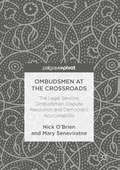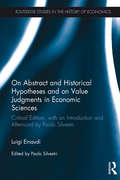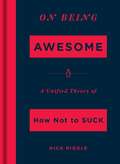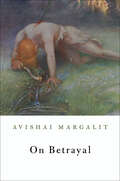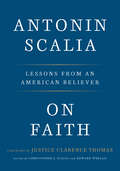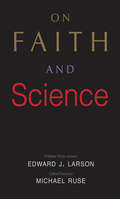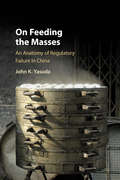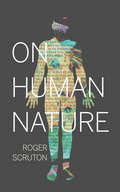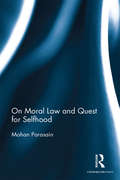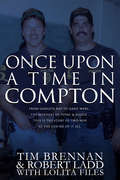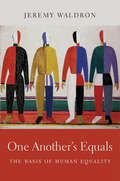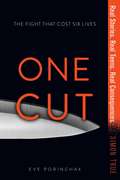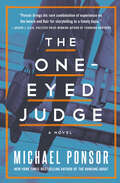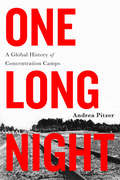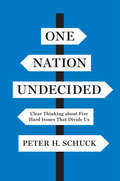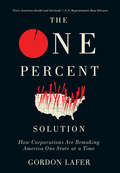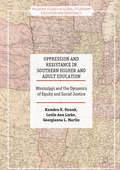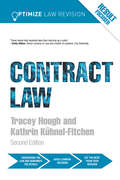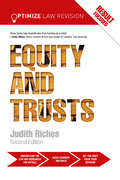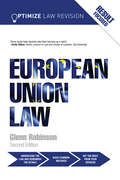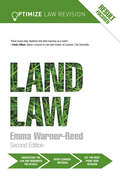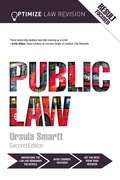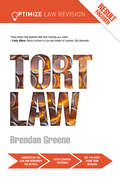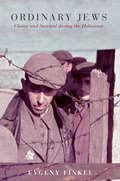- Table View
- List View
Ombudsmen at the Crossroads: The Legal Services Ombudsman, Dispute Resolution and Democratic Accountability
by Nick O'Brien Mary SeneviratneThis book charts the evolution of the Legal Services Ombudsman for England and Wales. Established in 1990, it had a statutory remit that explicitly recognized its dual responsibility for consumer dispute resolution and democratic accountability. It was replaced in 2010 by a very different type of ombudsman institution. The book describes how the Ombudsman reconciled its different roles and how far it succeeded in changing the mentality of the legal profession. The authors relate the Ombudsman’s successes and failures to current debates facing the ombudsman and regulatory community, and highlight the continuing potential of the ombudsman institution. The ombudsman institution emerges as a ‘third way’ between the courts and various forms of alternative dispute resolution, and as a creative and democratic means of responding to public grievance.
On Abstract and Historical Hypotheses and on Value Judgments in Economic Sciences: Critical Edition, with an Introduction and Afterword by Paolo Silvestri (Routledge Studies in the History of Economics)
by Luigi EinaudiLuigi Einaudi (1874-1961) was a leading liberal economist, economic historian and political figure. This book provides the English-speaking world with a first critical edition of Einaudi’s – hitherto unpublished – rewriting of one of his most unique and thoughtful essays. The relevance of this essay is crucial from several perspectives: history and methodology of economic thought, role of economics and its relation to other disciplines and to social values, role of economists in the public sphere, while also encompassing the discourse on man and the economist as a "whole man". The critical edition of On Abstract and Historical Hypotheses and on Value Judgments in Economic Sciences includes a comprehensive introduction and afterword. An extensive reappraisal of this newly discovered essay will help to cast light on Einaudi’s uniqueness and originality within and beyond the Italian tradition in public finance, thereby also illuminating his attempt to provide an epistemological account of his long lasting enquiry into the causes of good and bad polities. This book is of great interest to those who study economic theory and philosophy, as well as history of economic thought, public economics and legal and political philosophy.
On Being Awesome: A Unified Theory of How Not to Suck
by Nick RiggleIn this lively treatise, pro-skater-turned-philosopher Nick Riggle presents a theory of awesomeness (and its opposite, suckiness) that’s both sharply illuminating and more timely than ever “Nick Riggle’s fun book is ‘awesome’ by its own definition. But don’t miss its profound ambition, which is to show how philosophy unearths the structure of ordinary language, defines the meaning of life in routine business, and poses the question of how best to live.” —Aaron James, author of Assholes: A Theory We all know people who are awesome and people who suck, but what do we really mean by these terms? Have you ever been chill or game? Do you rock or rule? If so, then you’re tapped into the ethics of awesomeness. Awesome people excel at creating social openings that encourage expressions of individuality and create community. And if you’re a cheapskate, self-promoter, killjoy, or douchebag, you’re the type of person who shuts social openings down. Put more simply: You suck. From street art to folk singers, Proust to the great etiquette writer Emily Post, President Obama to former Los Angeles Dodger Glenn Burke, Riggle draws on pop culture, politics, history, and sports to explore the origins of awesome, and delves into the nuances of what it means to suck and why it’s so important to strive for awesomeness. An accessible and entertaining lens for navigating the ethics of our time, On Being Awesome provides a new and inspiring framework for understanding ourselves and creating meaningful connections in our everyday lives.
On Betrayal
by Avishai MargalitBetrayal seems to have lost its grip on the public consciousness in liberal societies, yet it is all around us, dissolving the thick glue of trust that holds friends, families, and communities together. By focusing on the ethics of betrayal, Avishai Margalit offers a philosophical account of what we owe those who give us our sense of belonging.
On Faith: Lessons from an American Believer
by Antonin ScaliaOn Faith is an inspiring collection of the late Supreme Court justice Antonin Scalia's reflections on his own faith, on the challenges that religious believers face in modern America, and on the religious freedoms protected by the Constitution. Featuring a personal introduction by Justice Scalia's son Father Paul Scalia, this volume will enrich every reader's understanding of the legendary justice.Antonin Scalia reflected deeply on matters of religion and shared his insights with many audiences over the course of his remarkable career. As a Supreme Court justice for three decades, he vigorously defended the American constitutional tradition of allowing religion a prominent place in the public square. As a man of faith, he recognized the special challenges of living a distinctively religious life in modern America, and he inspired other believers to meet those challenges. This volume contains Justice Scalia's incisive thoughts on these matters, laced with his characteristic wit. It includes outstanding speeches featured in Scalia Speaks and also draws from his Supreme Court opinions and his articles. In addition to the introduction by Fr. Scalia, other highlights include Fr. Scalia's beautiful homily at his father's funeral Mass and reminiscences from various friends and law clerks whose lives were influenced by Antonin Scalia's faith.
On Faith and Science
by Edward J. Larson Michael RuseA captivating historical survey of the key debates, questions, and controversies at the intersection of science and religion Throughout history, scientific discovery has clashed with religious dogma, creating conflict, controversy, and sometimes violent dispute. In this enlightening and accessible volume, distinguished historian and Pulitzer Prize–winning author Edward Larson and Michael Ruse, philosopher of science and Gifford Lecturer, offer their distinctive viewpoints on the sometimes contentious relationship between science and religion. The authors explore how scientists, philosophers, and theologians through time and today approach vitally important topics, including cosmology, geology, evolution, genetics, neurobiology, gender, and the environment. Broaching their subjects from both historical and philosophical perspectives, Larson and Ruse avoid rancor and polemic as they address many of the core issues currently under debate by the adherents of science and the advocates of faith, shedding light on the richly diverse field of ideas at the crossroads where science meets spiritual belief.
On Feeding the Masses
by John K. YasudaChina's food safety system is in crisis. Egregious scandals, as varied as the sale of liquor laced with Viagra and the distribution of fake eggs, reveal how regulatory practices have been stretched to their limit in the world's largest food production system. On Feeding the Masses focuses on the oft-cited but ultimately overlooked concept of scale to identify the root causes of China's regulatory failures in food safety. The 'politics of scale' framework highlights how regulators disagree on which level of government is best suited to regulate ('the scale of governance'), struggle to address multilevel tensions ('multidimensional scale integration'), and fail to understand how policies at one level of government can affect other levels of government in unexpected and costly ways ('scale externalities'). Drawing from over 200 interviews with food safety regulators and producers, the study provides one of the most comprehensive accounts of China's food safety crisis to date.
On Human Nature
by Roger ScrutonIn this short book, acclaimed writer and philosopher Roger Scruton presents an original and radical defense of human uniqueness. Confronting the views of evolutionary psychologists, utilitarian moralists, and philosophical materialists such as Richard Dawkins and Daniel Dennett, Scruton argues that human beings cannot be understood simply as biological objects. We are not only human animals; we are also persons, in essential relation with other persons, and bound to them by obligations and rights. Our world is a shared world, exhibiting freedom, value, and accountability, and to understand it we must address other people face to face and I to I.Scruton develops and defends his account of human nature by ranging widely across intellectual history, from Plato and Averroës to Darwin and Wittgenstein. The book begins with Kant's suggestion that we are distinguished by our ability to say "I"—by our sense of ourselves as the centers of self-conscious reflection. This fact is manifested in our emotions, interests, and relations. It is the foundation of the moral sense, as well as of the aesthetic and religious conceptions through which we shape the human world and endow it with meaning. And it lies outside the scope of modern materialist philosophy, even though it is a natural and not a supernatural fact. Ultimately, Scruton offers a new way of understanding how self-consciousness affects the question of how we should live.The result is a rich view of human nature that challenges some of today's most fashionable ideas about our species.
On Moral Law and Quest for Selfhood
by Mohan ParasainThis book offers an original intersection of concepts from Immanuel Kant’s moral command ethics and Søren Kierkegaard’s existential ethics. The Kantian formulation of moral law is based on theoretical ground while Kierkegaardian ethics of the quest for selfhood views it as the very act of living. The present work provides an account of both these perspectives and questions whether these approaches to morality are mutually exclusionary. Using Slavoj Žižek’s ‘parallax view’ in the realm of morality, it argues that moral philosophy must engage with a constant critique of ‘difference’ around which the transformation of our various perspectives to morality revolves. This work appeals for furtherance of the conversation model and participation of perspectives to transcend ‘positional confinement’. It advocates the traversing of the ethical parallax to allow for intellectual openness and an empathetic perception of the ‘other’. Engaging and well-researched, this book will be of interest to scholars and researchers of ethics, political philosophy and continental philosophy.
Once Upon A Time in Compton: From Gangsta Rap To Gang Wars... The Murders Of Tupac And Biggie... . This Is The Story Of Two Men At The Center Of It All
by Lolita Files Robert Ladd Tim BrennanFrom Gangsta rap to gang wars and everything in between…. Former Compton police officers Tim Brennan and Robert Ladd have seen it all….. And now, they’re telling all….. For twenty years, gang unit detectives Tim Brennan and Robert Ladd patrolled the streets of Compton. They witnessed the birth and rise of gangsta rap with acts they knew personally, such as N.W.A and D.J. Quik; dealt firsthand with the chaos of the L.A. riots, its aftermath, and the gang truce that followed; were involved in the investigations of the murders of hip-hop stars Tupac Shakur and The Notorious B.I.G., and were major players in an all-out tug-of-war with City Hall that ultimately resulted in the permanent shut-down of the Compton Police Department. Through it all, they developed an intricate knowledge of gangs and the streets and a methodology that has been implemented by local law enforcement agencies across the country. Their compassionate and fair approach to community policing earned them the respect of citizens and gangbangers alike. This story - told with bestselling author Lolita Files, whose research with Brennan and Ladd has spanned over four years - is a firsthand glimpse into a world during an era many have heard about in song and legend, but have rarely had the opportunity to witness at ground level, from the inside out, through the eyes of two men who witnessed and experienced it all.
One Another’s Equals: The Basis of Human Equality
by Jeremy WaldronAn enduring theme of Western philosophy is that we are all one another’s equals. Yet the principle of basic equality is woefully under-explored in modern moral and political philosophy. What does it mean to say we are all one another’s equals? Jeremy Waldron confronts this question fully and unflinchingly in a major new multifaceted account.
One Cut (Simon True)
by Eve PorinchakReal stories. Real teens. Real crimes. A backyard brawl turned media circus filled with gang accusations turns a small, quiet town upside down in this second book in the new Simon True series.On May 22, 1995 at 7 p.m. sixteen-year-old Jimmy Farris and seventeen-year-old Mike McLoren were working out outside Mike’s backyard fort. Four boys hopped the fence, and a fight broke out inside the dark fort made of two-by-four planks and tarps. Within minutes, both Mike and Jimmy had been stabbed. Jimmy died a short time later. While neighbors knew that the fort was a local hangout where drugs were available, the prosecution depicted the four defendants as gang members, and the crime as gang related. The accusations created a media circus, and added fuel to the growing belief that this affluent, safe, all-white neighborhood was in danger of a full-blown gang war. Four boys stood trial. All four boys faced life sentences. Why? Because of California’s Felony Murder Rule. The law states that “a death is considered first degree murder when it is commissioned during one of the following felonies: Arson, Rape, Carjacking, Robbery, Burglary, Mayhem, Kidnapping.” In other words, if you—or somebody you are with—intends to commit a felony, and somebody accidentally dies in the process, all parties can be tried and convicted of first degree murder and sentenced to life without parole, even if nobody had any intention of committing a murder. What really happened that day? Was it a case of robbery gone wrong? Gang activity? Or was it something else?
The One-Eyed Judge: A Novel (The Judge Norcross Novels #2)
by Michael PonsorThe stunning new legal thriller from the New York Times–bestselling author of The Hanging Judge, &“a talent to watch&” (The Washington Post). When FBI agents barge into Sidney Cranmer&’s home accusing him of a heinous crime, the respected literature professor&’s life becomes a nightmare. Cranmer insists the illicit material found by the agents isn&’t his, but the charge against him appears airtight, and his academic specialty—the life and work of controversial author Lewis Carroll, creator of Alice&’s Adventures in Wonderland—convinces investigators he&’s lying. Presiding over the case against Professor Cranmer, U.S. District Judge David Norcross fears his daily confrontation with evil has made him too jaded to become a husband and father. His girlfriend, Claire Lindemann, teaches in the same department as the defendant and is convinced of his innocence. Soon, she will take matters into her own hands. Meanwhile—with his love life in turmoil and his plans for the future on hold—a personal tragedy leaves Norcross responsible for his two young nieces. Unbeknownst to him, a vengeful child predator hovers over his new family, preparing to strike. Michael Ponsor&’s debut novel, The Hanging Judge, was praised by retired Supreme Court justice John Paul Stevens for reminding readers &“that the judicial process is not infallible&” and by Pulitzer Prize–winning author Tracy Kidder for bearing &“the heft of authenticity.&” The One-Eyed Judge again draws on Ponsor&’s thirty years as a US district judge, offering readers an insider&’s view of one of the most harrowing kinds of cases faced by the courts. Fast-paced, thrilling, and thought-provoking, this is legal fiction at its most realistic and compelling. The One-Eyed Judge is the 2nd book in the Judge Norcross Novels, but you may enjoy reading the series in any order.
One Long Night: A Global History of Concentration Camps
by Andrea PitzerA groundbreaking, haunting, and profoundly moving history of modernity's greatest tragedy: concentration campsFor over 100 years, at least one concentration camp has existed somewhere on Earth. First used as battlefield strategy, camps have evolved with each passing decade, in the scope of their effects and the savage practicality with which governments have employed them. Even in the twenty-first century, as we continue to reckon with the magnitude and horror of the Holocaust, history tells us we have broken our own solemn promise of "never again."In this harrowing work based on archival records and interviews during travel to four continents, Andrea Pitzer reveals for the first time the chronological and geopolitical history of concentration camps. Beginning with 1890s Cuba, she pinpoints concentration camps around the world and across decades. From the Philippines and Southern Africa in the early twentieth century to the Soviet Gulag and detention camps in China and North Korea during the Cold War, camp systems have been used as tools for civilian relocation and political repression. Often justified as a measure to protect a nation, or even the interned groups themselves, camps have instead served as brutal and dehumanizing sites that have claimed the lives of millions.Drawing from exclusive testimony, landmark historical scholarship, and stunning research, Andrea Pitzer unearths the roots of this appalling phenomenon, exploring and exposing the staggering toll of the camps: our greatest atrocities, the extraordinary survivors, and even the intimate, quiet moments that have also been part of camp life during the past century.
One Nation Undecided: Clear Thinking about Five Hard Issues That Divide Us
by Peter H. SchuckLet's be honest, we've all expressed opinions about difficult hot-button issues without always thinking them through. With so much media spin, political polarization, and mistrust of institutions, it's hard to know how to think about these tough challenges, much less what to do about them. One Nation Undecided takes on some of today's thorniest issues and walks you through each one step-by-step, explaining what makes it so difficult to grapple with and enabling you to think smartly about it.In this unique what-to-do book, Peter Schuck tackles poverty, immigration, affirmative action, campaign finance, and religious objections to gay marriage and transgender rights. For each issue, he provides essential context; defines key concepts and values; presents the relevant empirical evidence; describes and assesses the programs that now seek to address it; and considers many plausible solutions. Schuck looks at all sides with scrupulous fairness while analyzing them rigorously and factually. Each chapter is self-contained so that readers may pick and choose among the issues that interest and concern them most. His objective is to educate rather than proselytize you—the very nature of these five issues is that they resist clear answers; reasonable people can differ about where they come out on them.No other book provides such a comprehensive, balanced, and accessible analysis of these urgent social controversies. One Nation Undecided gives you the facts and competing values, makes your thinking about them more sophisticated, and encourages you to draw your own conclusions.
The One Percent Solution: How Corporations Are Remaking America One State at a Time
by Gordon LaferIn the aftermath of the 2010 Citizens United decision, it's become commonplace to note the growing political dominance of a small segment of the economic elite. But what exactly are those members of the elite doing with their newfound influence? The One Percent Solution provides an answer to this question for the first time. Gordon Lafer's book is a comprehensive account of legislation promoted by the nation's biggest corporate lobbies across all fifty state legislatures and encompassing a wide range of labor and economic policies.In an era of growing economic insecurity, it turns out that one of the main reasons life is becoming harder for American workers is a relentless—and concerted—offensive by the country’s best-funded and most powerful political forces: corporate lobbies empowered by the Supreme Court to influence legislative outcomes with an endless supply of cash. These actors have successfully championed hundreds of new laws that lower wages, eliminate paid sick leave, undo the right to sue over job discrimination, and cut essential public services.Lafer shows how corporate strategies have been shaped by twenty-first-century conditions—including globalization, economic decline, and the populism reflected in both the Trump and Sanders campaigns of 2016. Perhaps most important, Lafer shows that the corporate legislative agenda has come to endanger the scope of democracy itself. For anyone who wants to know what to expect from corporate-backed Republican leadership in Washington, D.C., there is no better guide than this record of what the same set of actors has been doing in the state legislatures under its control.
Open Licensing Playbook
by U.S. Department of StateFederal Open Licensing Playbook, a list of considerations, use cases, and recommendations for federal departments interested in developing and implementing open license requirements on federally-funded grant projects. It is designed to assist federal efforts to maximize the impact of grant funds, and create opportunities for innovation and collaborative practices using federally-funded resources.
Oppression and Resistance in Southern Higher and Adult Education
by Kamden K. Strunk Leslie Ann Locke Georgianna L. MartinThis book explores the long history of oppression and resistance in adult and higher education, situated in Mississippi. The state serves as a unique site in which intersecting narratives around race, ethnicity, social class, opportunity, democracy, and equity have played out over the past several decades. In this book, the authors highlight the experiences of students and adults in Mississippi who provide both covert, subtle resistance to the dominant, oppressive educational narrative in the state, as well as those who provide active, visible resistance. Using critical pedagogy and critical theory to drive their analysis, the authors highlight the systematic and continuous nature of oppression, and theorize ways forward toward liberation in Mississippi, the South, and the nation.
Optimize Contract Law (Optimize)
by Tracey Hough Kathrin Kuhnel-FitchenThe Optimize series is designed to show you how to apply your knowledge in assessment. These concise revision guides cover the most commonly taught topics, and provide you with the tools to: Understand the law and remember the details using diagrams and tables throughout to demonstrate how the law fits together Contextualise your knowledge identifying and explaining how to apply legal principles for important cases providing cross-references and further reading to help you aim higher in essays and exams Avoid common misunderstandings and errors identifying common pitfalls students encounter in class and in assessment Reflect critically on the law identifying contentious areas that are up for debate and on which you will need to form an opinion Apply what you have learned in assessment presenting learning objectives that reflect typical assessment criteria providing sample essay and exam questions, supported by end-of chapter feedback The series is also supported by comprehensive online resources that allow you to track your progress during the run-up to exams. This second edition has been fully amended to reflect the latest cases and developments in the Law, as well as new and improved diagrams throughout
Optimize Equity and Trusts (Optimize)
by Judith RichesThe Optimize series is designed to show you how to apply your knowledge in assessment. These concise revision guides cover the most commonly taught topics, and provide you with the tools to: Understand the law and remember the details using diagrams and tables throughout to demonstrate how the law fits together Contextualise your knowledge identifying and explaining how to apply legal principles for important cases providing cross-references and further reading to help you aim higher in essays and exams Avoid common misunderstandings and errors identifying common pitfalls students encounter in class and in assessment Reflect critically on the law identifying contentious areas that are up for debate and on which you will need to form an opinion Apply what you have learned in assessment presenting learning objectives that reflect typical assessment criteria providing sample essay and exam questions, supported by end-of chapter feedback The series is also supported by comprehensive online resources that allow you to track your progress during the run-up to exams.
Optimize European Union Law (Optimize)
by Glenn RobinsonThe Optimize series is designed to show you how to apply your knowledge in assessment. These concise revision guides cover the most commonly taught topics, and provide you with the tools to: Understand the law and remember the details using diagrams and tables throughout to demonstrate how the law fits together Contextualise your knowledge identifying and explaining how to apply legal principles for important cases providing cross-references and further reading to help you aim higher in essays and exams Avoid common misunderstandings and errors identifying common pitfalls students encounter in class and in assessment Reflect critically on the law identifying contentious areas that are up for debate and on which you will need to form an opinion Apply what you have learned in assessment presenting learning objectives that reflect typical assessment criteria providing sample essay and exam questions, supported by end-of chapter feedback The series is also supported by comprehensive online resources that allow you to track your progress during the run-up to exams.
Optimize Land Law (Optimize)
by Emma Warner-ReedThe Optimize series is designed to show you how to apply your knowledge in assessment. These concise revision guides cover the most commonly taught topics, and provide you with the tools to: Understand the law and remember the details using diagrams and tables throughout to demonstrate how the law fits together Contextualise your knowledge identifying and explaining how to apply legal principles for important cases providing cross-references and further reading to help you aim higher in essays and exams Avoid common misunderstandings and errors identifying common pitfalls students encounter in class and in assessment Reflect critically on the law identifying contentious areas that are up for debate and on which you will need to form an opinion Apply what you have learned in assessment presenting learning objectives that reflect typical assessment criteria providing sample essay and exam questions, supported by end-of-chapter feedback The series is also supported by comprehensive online resources that allow you to track your progress during the run-up to exams.
Optimize Public Law (Optimize)
by Ursula SmarttThe Optimize series is designed to show you how to apply your knowledge in assessment. These concise revision guides cover the most commonly taught topics, and provide you with the tools to: Understand the law and remember the details using diagrams and tables throughout to demonstrate how the law fits together Contextualise your knowledge identifying and explaining how to apply legal principles for important cases providing cross-references and further reading to help you aim higher in essays and exams Avoid common misunderstandings and errors identifying common pitfalls students encounter in class and in assessment Reflect critically on the law identifying contentious areas that are up for debate and on which you will need to form an opinion Apply what you have learned in assessment presenting learning objectives that reflect typical assessment criteria providing sample essay and exam questions, supported by end-of chapter feedback The series is also supported by comprehensive online resources that allow you to track your progress during the run-up to exams.
Optimize Tort Law (Optimize)
by Brendan GreeneThe Optimize series is designed to show you how to apply your knowledge in assessment. These concise revision guides cover the most commonly taught topics, and provide you with the tools to: Understand the law and remember the details using diagrams and tables throughout to demonstrate how the law fits together Contextualise your knowledge identifying and explaining how to apply legal principles for important cases providing cross-references and further reading to help you aim higher in essays and exams Avoid common misunderstandings and errors identifying common pitfalls students encounter in class and in assessment Reflect critically on the law identifying contentious areas that are up for debate and on which you will need to form an opinion Apply what you have learned in assessment presenting learning objectives that reflect typical assessment criteria providing sample essay and exam questions, supported by end-of chapter feedback The series is also supported by comprehensive online resources that allow you to track your progress during the run-up to exams.
Ordinary Jews: Choice and Survival during the Holocaust
by Evgeny FinkelFocusing on the choices and actions of Jews during the Holocaust, Ordinary Jews examines the different patterns of behavior of civilians targeted by mass violence. Relying on rich archival material and hundreds of survivors' testimonies, Evgeny Finkel presents a new framework for understanding the survival strategies in which Jews engaged: cooperation and collaboration, coping and compliance, evasion, and resistance. Finkel compares Jews' behavior in three Jewish ghettos—Minsk, Kraków, and Białystok—and shows that Jews' responses to Nazi genocide varied based on their experiences with prewar policies that either promoted or discouraged their integration into non-Jewish society. Finkel demonstrates that while possible survival strategies were the same for everyone, individuals' choices varied across and within communities. In more cohesive and robust Jewish communities, coping—confronting the danger and trying to survive without leaving—was more organized and successful, while collaboration with the Nazis and attempts to escape the ghetto were minimal. In more heterogeneous Jewish communities, collaboration with the Nazis was more pervasive, while coping was disorganized. In localities with a history of peaceful interethnic relations, evasion was more widespread than in places where interethnic relations were hostile. State repression before WWII, to which local communities were subject, determined the viability of anti-Nazi Jewish resistance.Exploring the critical influences shaping the decisions made by Jews in Nazi-occupied eastern Europe, Ordinary Jews sheds new light on the dynamics of collective violence and genocide.
